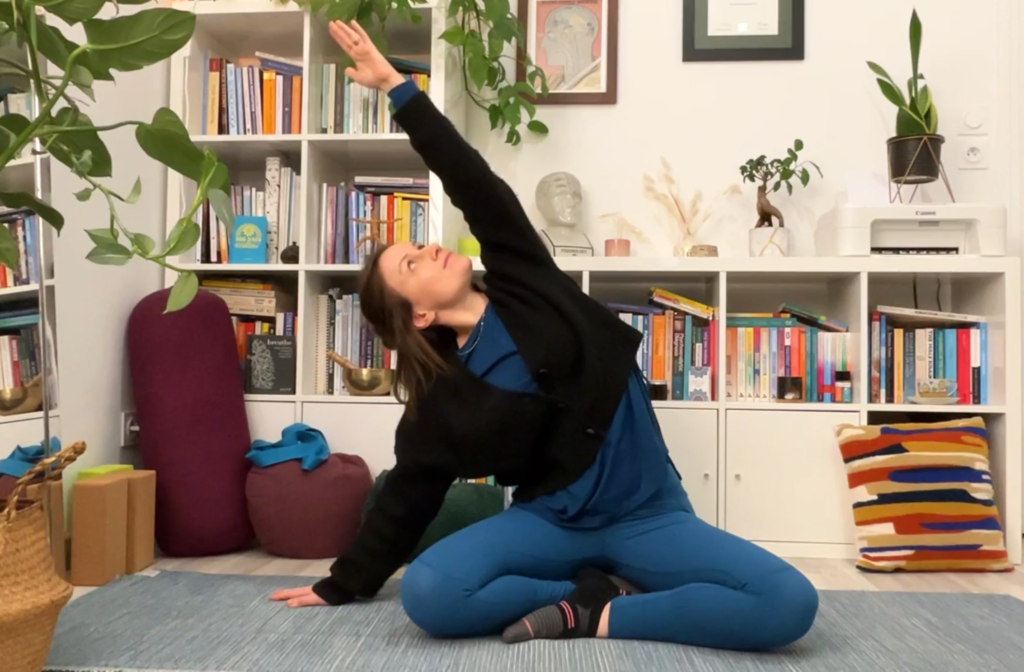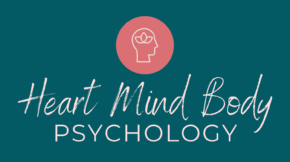Yoga for Self-Understanding: Reflecting Life Patterns on the Mat
This week, I filmed a gentle seated mindful practice to share with clients (see a screenshot below!). This was intended as an introduction to how we can begin to meet our bodies and minds where they’re at, to ‘tune in’ and grow awareness of what we may need to support ourselves and learn how we can offer this to ourselves with wisdom and a caring commitment.
Here’s a little about how a yoga practice can help us to understand ourselves better and lend us a hand in moving towards the changes that we seek.

Recognising and Understanding Patterns through Yoga
Recognising our emotional, psychological, and physical needs can be challenging, especially in today’s fast-paced world that often encourages tuning out rather than tuning in. Many things in modern life, such as social media, are designed to capture and maintain our attention. The more our attention is captured by things outside of ourselves, the more we may miss important information coming from within ourselves. The challenge of recognising our needs is greater still if they were not adequately nurtured during our childhood development.
On the yoga mat, we have the opportunity to ‘tune in’ to ourselves and learn to recognise and make sense of our body’s signals and to better understand ourselves. The more we practice, the more skillful we become at noticing and recognising signals and patterns in our body and mind. We may begin to notice how the same patterns we have in our approach to life, our beliefs about ourselves, and our relationships, can start to play out on the yoga mat as well!
The Connection Between Yoga Practice and Daily Life
A yoga practice can be so much more than physical; it can be a mirror reflecting the beliefs we hold about ourselves and how these manifest both on the mat and off the mat in our everyday lives.
On the mat, we can explore, with gentle curiosity, how we meet ourselves. We can grow our awareness of our tendencies and habits and begin to discern what is working or not working for us, in service of creating a better, healthier, and more meaningful life for ourselves and others.
Learning from Our Yoga Mat: Life Lessons in Self-Awareness
For example, by observing how we push our limits or how we handle discomfort, we can uncover underlying beliefs that may not be serving us. These realisations on the mat can powerfully translate into our daily lives, helping us move forward with more compassionate and effective approaches.
For example, if we find ourselves pushing our bodies beyond what they’re ready for, and feeling pain as a result, we may ask ourselves:
- Is my belief about what I ‘should’ be doing leading me into unhelpful or even harmful actions?
- Where did I learn to dismiss my own feelings, or develop the belief that I have to force myself harshly through discomfort, instead of helping myself to progress and learn more effectively with patience and understanding?
- How can I begin to notice this belief showing up on the mat, and in my life, so that I may help myself to move forward with my goals with compassionate motivation, instead of painful and ineffective harmful words and actions?
By observing these patterns, we might start to notice how some of our habitual ways of thinking and doing are not serving us well in our lives, despite our best intentions and efforts. Once we become more aware of any unhelpful ineffective patterns, we can choose to learn a more self-compassionate approach, rather than one of self-criticism.
Trying to motivate ourselves to change through self-criticism may come from a place of good intentions, but when we start to look at the effects of this, we may start to see how it can cause more harm than good. In fact, this is supported by research too, which has found that compassionate motivation is more effective than self-critical motivation.
Carrying Yoga's Lessons Into Everyday Existence
So, if you are feeling stuck and unsure of how you keep repeating the same unhelpful patterns, maybe you can take the stuckness to your yoga mat and see what happens when you bring an intention to meet yourself in a curious and compassionate way. This can not only enhance your yoga practice, if you have one already, but it can also enrich daily life with greater understanding and kindness.
Interested to learn more?
If you’d like to learn more about how you can use yoga as a tool for understanding and change-making, get in touch for a consultation and we can explore this together!
You can contact me by email at bethstroyde@protonmail.com or by clicking the green ‘get in touch’ button below.
If you are interested to learn more about psychological therapies, yoga, or the integration of both, you can follow this blog and my Instagram page (@heartmindbodypsychology) so you can see future posts on these subjects and more.
PS: If you are starting a yoga practice for the first time, then remember: consider your own body and limits. If you have concerns about your health or have a medical condition, consult your doctor before starting a physical or breathwork practice.
